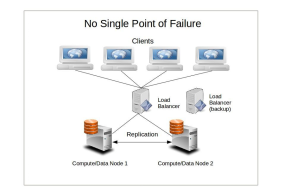
In today’s fast-paced digital landscape, businesses and individuals alike are constantly seeking reliable and high-performing solutions for their online presence. One such solution that has gained immense popularity is cloud hosting. With its scalability, flexibility, and advanced features, cloud hosting has revolutionized the way we manage and deploy our digital assets. In this comprehensive guide, we delve into the world of cloud hosting, exploring the benefits, top providers, and actionable tips for maximizing its potential.
Unleashing the Power of Cloud Hosting
Understanding Cloud Hosting
Cloud hosting, a groundbreaking technology, is a method of hosting websites and applications on virtual servers that tap into vast networks of physical servers. Unlike traditional hosting methods, cloud hosting provides unparalleled scalability and reliability. The distributed nature of cloud hosting allows for seamless expansion of resources, ensuring optimal performance even during traffic spikes or high user demand. By harnessing the power of the cloud, businesses can unlock new levels of efficiency, cost-effectiveness, and flexibility.
The Benefits of Cloud Hosting
- Enhanced Scalability: Cloud hosting empowers businesses to scale their resources effortlessly. With the ability to quickly and dynamically adjust server resources based on demand, organizations can handle sudden traffic surges or accommodate significant growth without disruption. This scalability ensures consistent performance and avoids any potential downtime.
- Reliability and Uptime: Cloud hosting leverages redundant servers and failover mechanisms to ensure maximum uptime. By spreading data across multiple servers and locations, cloud hosting minimizes the risk of single-point failures and guarantees high availability for websites and applications.
- Cost Efficiency: With cloud hosting, businesses can optimize their costs by paying only for the resources they use. Unlike traditional hosting models that require upfront investments in hardware, cloud hosting operates on a pay-as-you-go basis. This flexible pricing structure enables businesses to align their hosting expenses with their actual needs, resulting in significant cost savings.
- Global Reach: Cloud hosting providers have a worldwide presence, allowing businesses to deploy their digital assets closer to their target audience. By leveraging geographically distributed servers, content delivery networks (CDNs), and edge computing capabilities, businesses can deliver faster loading speeds and an enhanced user experience to their global customer base.
Top Cloud Hosting Providers
When it comes to cloud hosting, several providers stand out for their reliability, performance, and feature-rich offerings. Here are three leading cloud hosting providers worth considering:
- Google Cloud Hosting: Known for its exceptional performance and reliability, Google Cloud Hosting offers a wide range of services tailored to various business needs. With its global infrastructure, cutting-edge security measures, and comprehensive suite of tools, Google Cloud Hosting empowers businesses to scale effortlessly while ensuring top-notch performance.
- Amazon Web Services (AWS): As a pioneer in cloud computing, AWS provides an extensive portfolio of cloud hosting services. From computing power to storage, databases to artificial intelligence, AWS offers a vast array of scalable and flexible solutions. With its robust ecosystem and reliable infrastructure, AWS remains a popular choice among businesses of all sizes.
- Microsoft Azure: With its enterprise-grade infrastructure and powerful set of services, Microsoft Azure delivers a comprehensive cloud hosting solution. From virtual machines to analytics, identity management to IoT integration, Azure offers a wide range of tools and resources. Backed by Microsoft’s industry expertise, Azure is an excellent choice for businesses seeking seamless scalability and advanced features.
Actionable Tips for Maximizing Cloud Hosting Potential
- Optimize Resource Allocation: Take advantage of the scalability of cloud hosting by regularly assessing your resource allocation. Monitor your website or application’s performance metrics and adjust the resources accordingly. By efficiently allocating resources, you can avoid unnecessary costs and ensure optimal performance.
- Implement Content Delivery Networks (CDNs): CDNs are a valuable addition to any cloud hosting strategy. By caching and distributing content across multiple servers globally, CDNs significantly reduce latency and improve website loading speeds. Integrate a CDN into your cloud hosting setup to enhance the user experience and boost your website’s performance.
- Leverage Autoscaling and Load Balancing: Autoscaling and load balancing are critical features offered by cloud hosting providers. Autoscaling enables your infrastructure to automatically adjust resources based on demand, while load balancing distributes traffic across multiple servers for optimal performance. Configure these features appropriately to ensure seamless scalability and efficient resource utilization.
Frequently Asked Questions (FAQs)
- What sets cloud hosting apart from traditional hosting?
- Cloud hosting offers unparalleled scalability, while traditional hosting has fixed resource limitations.
- Cloud hosting leverages distributed servers, ensuring high availability, while traditional hosting relies on a single server.
- Cloud hosting operates on a pay-as-you-go model, while traditional hosting requires upfront investments.
- How does cloud hosting ensure data security?
- Cloud hosting providers implement robust security measures, such as data encryption, regular backups, and advanced access controls.
- Compliance with industry standards, such as GDPR and HIPAA, ensures data protection and privacy.
- Cloud hosting providers offer comprehensive monitoring and threat detection systems to safeguard data from unauthorized access.
- Can cloud hosting handle high traffic volumes?
- Yes, cloud hosting is designed to handle high traffic volumes by providing scalable resources on-demand.
- With autoscaling and load balancing features, cloud hosting ensures consistent performance even during traffic spikes.
- Cloud hosting providers offer powerful infrastructure capable of supporting websites and applications with millions of users.
- What is the difference between public, private, and hybrid cloud hosting?
- Public cloud hosting involves sharing resources with multiple users and offers cost-effective scalability.
- Private cloud hosting provides dedicated resources exclusively for a single organization, ensuring enhanced security and control.
- Hybrid cloud hosting combines both public and private cloud infrastructures, offering flexibility and the ability to leverage the best of both worlds.
- How can I migrate my existing website to cloud hosting?
- Consult with your cloud hosting provider for migration assistance and guidance.
- Backup your existing website data and files, ensuring a smooth transition.
- Follow the recommended steps provided by the cloud hosting provider, which may involve DNS changes and database migration.
Conclusion
Cloud hosting has emerged as a game-changer in the world of web hosting, enabling businesses to achieve unparalleled scalability, reliability, and cost-efficiency. By harnessing the power of cloud hosting, organizations can optimize their digital assets and deliver exceptional user experiences. With the actionable tips and insights shared in this guide, you can unlock the true potential of cloud hosting and position your online presence for success in the digital era.
Advertisement







